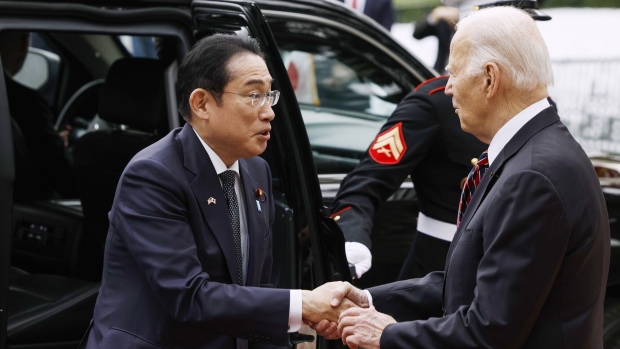Apr 9, 2024
China Tensions At Center of Biden’s Summit With Kishida, Marcos
, Bloomberg News

(Bloomberg) -- The White House summit Thursday between President Joe Biden, Philippine President Ferdinand Marcos Jr. and Japanese Prime Minister Fumio Kishida has one overriding goal: deepening US cooperation with two key allies on the front lines of tensions with China.
Washington is seeking to boost cooperation and coordination among allies in the Indo-Pacific region in a bid to counter China as Beijing presses claims over Taiwan and the East and South China Seas.
The three leaders want to do more to prevent China from going any further, and will discuss advancing trilateral cooperation in strategic areas including security, emerging technologies and supply chains, according to a White House statement.
“The United States, Japan, and the Philippines are three closely aligned maritime democracies with increasingly convergent strategic objectives, interests, and, frankly, concerns in areas like the South China Sea,” White House spokesman John Kirby said on Monday. “The leaders are expected to announce new initiatives across a range of important issues.”
Biden and Kishida will kick-start that effort in their joint meeting on Wednesday. The two leaders are expected to announce plans for a council on defense industries and a plan to allow shipyard workers in Japan to do more maintenance on US Navy ships. Improving production of the Patriot-3 missile in Japan — which suffers from massive cost overruns — could be one project for the new council to take on, according to a senior US official.
Kishida’s trip is the first official visit by a Japanese leader in nine years, and he’ll be the fifth world leader honored by the Biden administration with a state dinner. The last three also honored key Indo-Pacific partners: South Korea, India and Australia.
Japan may also take on a greater role in working with the Aukus security partnership made up of Australia, the US and the UK. While Australian Prime Minister Anthony Albanese said this week there are “no plans” to formally make Japan a member of the bloc, senior officials say the Aukus nations will consider working with Tokyo on the alliance’s so-called Pillar II, which covers advanced technologies such as hypersonic weapons, artificial intelligence and quantum computing.
On Thursday, the two leaders will be joined by Marcos, with China’s continuing assertiveness in the South China Sea — which has led to clashes between Chinese coast guard ships and Philippine vessels — likely to dominate talks. The US and its allies say they don’t want a conflict with China, instead focusing on the importance of freedom of navigation in the waterway, a critical conduit for global trade.
“In terms of defending the free and open international order based on the rule of law, cooperation between these three countries is extremely important,” Kishida told reporters Monday before departing for Washington.
The summit comes days after the three nations, along with Australia, conducted their first-ever quadrilateral drills in the South China Sea in what US Ambassador in Japan Rahm Emanuel called “a new era in regional security and collaboration.”
China blames the US for building divisive geopolitical blocs and for emboldening the Philippines as it tries to push back against Beijing’s sweeping territorial claims in the contested waters.
Under Marcos, the US previously secured expanded military access to four Philippine bases, including those close to another regional flashpoint, Taiwan. Manila and Tokyo are likewise negotiating on an anticipated reciprocal troop pact that could reportedly come soon.
“It’s a clear message that we’re giving — to any aggression coming from any country — that all allies are working together,” Philippine Ambassador to the US Jose Manuel Romualdez said ahead of the summit. “We are on the same page as far as defense and security of our region is concerned.”
--With assistance from Takashi Hirokawa and Michelle Jamrisko.
©2024 Bloomberg L.P.





